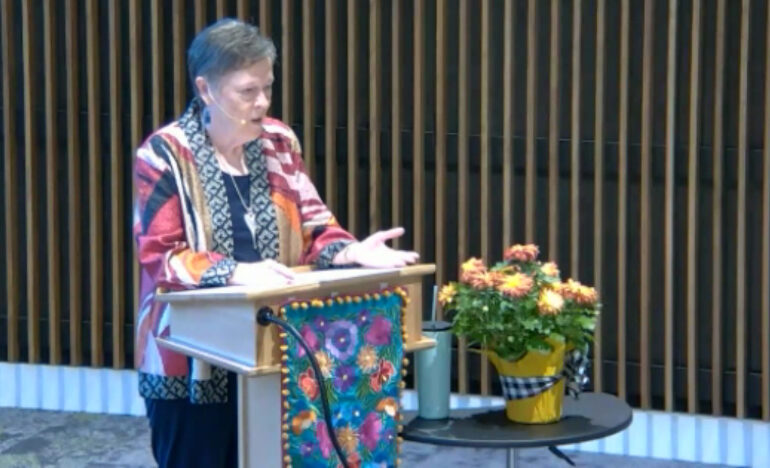The Art of Invitation

An Assembling God’s Puzzle video
By Fr. Garry Richmeier, C.PP.S.
Deep down, we human beings are pretty much the same. We all share the same dreams, hopes, sorrows, joys, fears, pains, etc. But we vary greatly in our individual views, thinking, and ideas regarding how we approach those common human experiences. And yet we have to figure out ways to bridge our differences so we can work together to create a world for all of us to live in. This is no easy task, but it is a piece of the puzzle of life that we have to figure out. Unfortunately, we often resort to methods that seem expeditious and efficient, but which cause us problems in the long run.
To get people to do what we want them to do, rather than what they might want to do, we often use threats. Threats are ways we attempt to control others. Like when a boss threatens to fire an employee if they don’t do what they are supposed to. This may work somewhat, but if that is the only way used to motivate someone, they will probably find ways to get around doing the work while still not getting fired, and the business suffers as a result.
It is the same when countries threaten other countries with military or economic sanctions. The countries may appear to do what they are supposed to, but an underlying resentment and hate may brew and eventually erupt into retaliation.
Religions often threaten their members with the possibility of going to hell if they do not do what they are supposed to. This does nothing to promote an image of God as love, and it often results in members doing only the minimum required for avoiding hell, and don’t feel the need to do the maximum which love calls for.
We also use shame and guilt to try to control others when we don’t have anything else to threaten them with. We first become familiar with this dynamic as children, when our parents (intentionally or unintentionally) tell us we have to behave or we are not a “good” boy or girl. In this election year, people try to shame others for holding an opposing view by calling them unpatriotic. And again, religions often use shame and guilt to try to control people by declaring them sinful if they don’t tow the party line.
Using threats, shame, or guilt to control the actions of others is a hierarchical, top-down maneuver which separates people from each other. On the one side, there are the people who are doing the threatening or shaming. On the other side are the people being threatened and shamed. This usually ends up in mutual threats and shaming, dividing and alienating people from each other, resulting in war on some level, and being detrimental to all.
If we want to maintain and nurture interpersonal relationships in working toward change, we need something other than threat or shame. Another possibility is the use of invitation. When we extend invitations to others to a different way of behaving or doing things, we are asking them to join us in a common work, reaching a common goal. This is a way of valuing the other person rather than simply criticizing them or demeaning them in some way. It joins us together, rather than dividing us into “us” and “them.”
This strategy upholds the value of relationship in addition to the value of changing behavior, and is much more constructive and effective. This often results in more substantive and long-lasting change.
But using invitations rather than force or threat requires more work, more time, more energy, and more patience. It also requires a basic trust of human nature, trusting that if another is treated respectfully, they will likely respond in kind. Of course, there are no guarantees in this regard. That is why threat is often chosen instead.
There is an art to extending invitations. First of all, what a person is being invited to must be possible for all involved. And the invitation must be “inviting,” that is, it has to include something the person would want. People don’t accept invitations to things that are only unpleasant or that they have no interest in. So an effective invitation will make clear how the person will benefit if they accept the invitation. A good invitation will not be an ultimatum, but will leave room for discussion.
This can be particularly challenging for the person extending the invitation. He or she must be ready to accept the possibility that the outcome won’t be exactly as they planned it. People can accept an invitation or decline it. But if the goal is something that is inviting, and they have a role in “tweaking” or adjusting the process, they are more likely to accept the invitation to change.
This is why extending invitations must be a dialogue and a team effort. And as with any collaboration, the results usually are not what either side envisioned in the first place, but are better than what was.
Extending invitations to change rather than trying to force people to change is a way to balance getting things done, with valuing relationship. This is really our faith story also. From creation, God has been inviting us to become more loving people. God doesn’t force us, God invites us. Sometimes we’ve accepted the invitation, and many times we’ve rejected the invitation. But through it all, God has valued God’s relationship with us, and maintained it out of love. When we work with others using invitations, rather than threat, force, or shame, we are reflecting how God works with us. And maybe that is worth the effort.
All of the videos in this series can be found here: Assembly God’s Puzzle.
Never miss an article published on the Renewal Center website: Sign up to receive our newsletters.
[Fr. Garry Richmeier, a Precious Blood priest and spiritual director, holds a Master’s of Divinity Degree from St John’s University in Collegeville, Minnesota, and a Master’s of Counseling Psychology degree from the University of Missouri-Kansas City. He is a licensed professional counselor and a licensed marriage and family therapist.]
ID 31639637 © Ailaimages | Dreamstime.com — The Art of Invitation — An Assembling God’s Puzzle video
We’d Like to Hear from You!
We’d like to know what you think about this article. Send us a comment using the form below. Do you have a suggestion? Is there something you want to learn more about? Send us a note.
Related

Discover Lectio Divina
Presented by Kathy Keary
This is a recording of “Discover Lectio Divina” presented by Kathy Keary at Precious Blood Renewal Center in Liberty, Missouri, on Oct. 2, 2025.

Do You Hear What I Hear?
By Fr. Garry Richmeier, C.PP.S.
How can we avoid the harmful affects of the polarization that characterizes so much of our lives these days? One step toward this end is to cultivate a greater understanding and appreciation for the idea of relativity in human behavior.
Categories
Assembling God's Puzzle Coffee with Padre Cooking & Spirituality Encounters of the 4th Kind Family Matters Guided Meditations Reflections on the Eucharsitic Prayers Spiritual Resources Taize Prayers Teach Us to Pray The Contemplative Life Traveling with Pilgrims of Hope Uncategorized Videos Week of Prayer for Christian Unity When you need a little help
